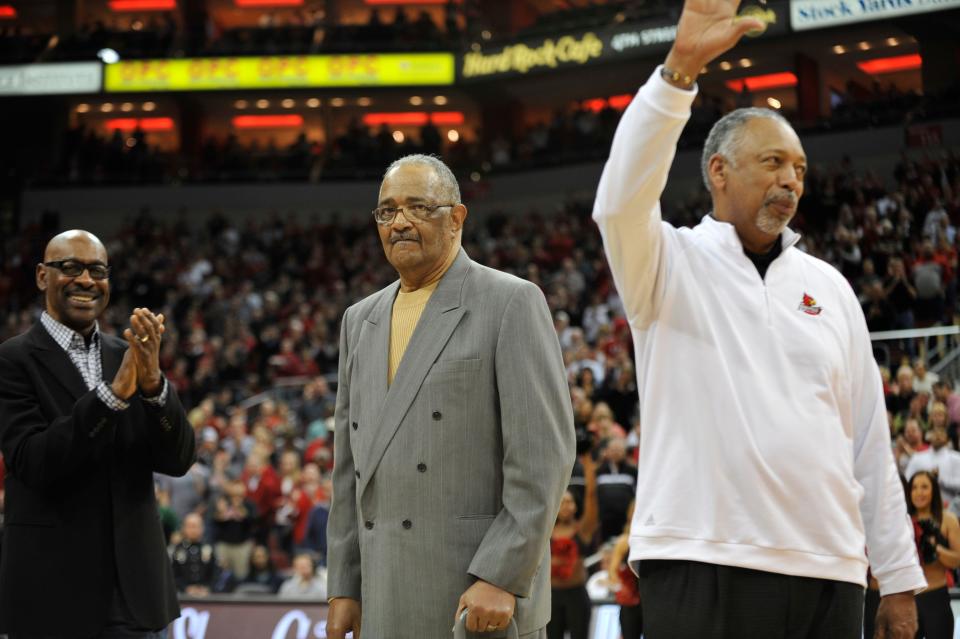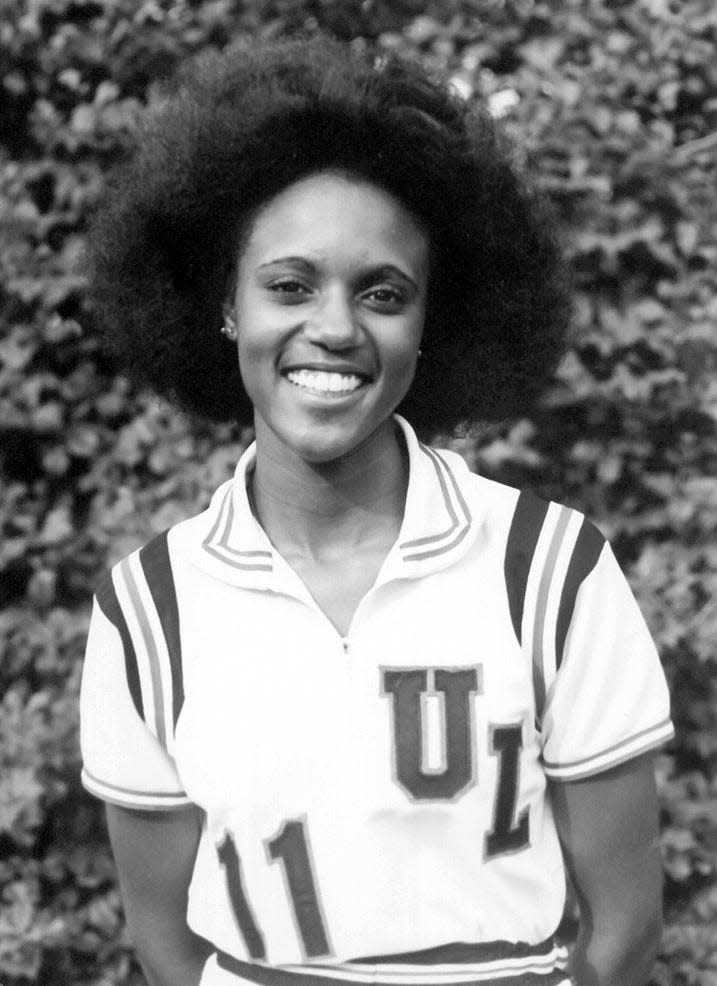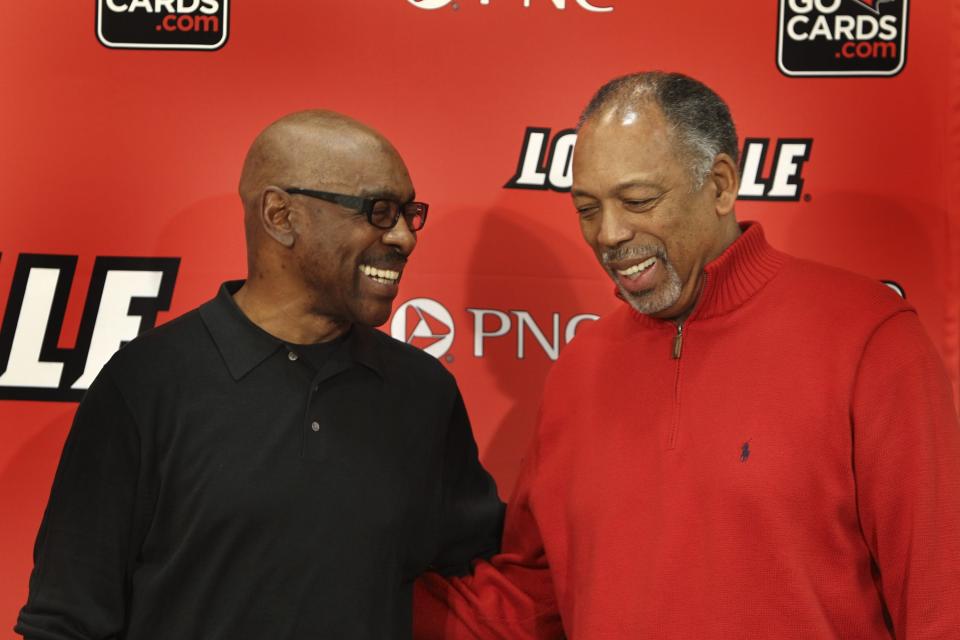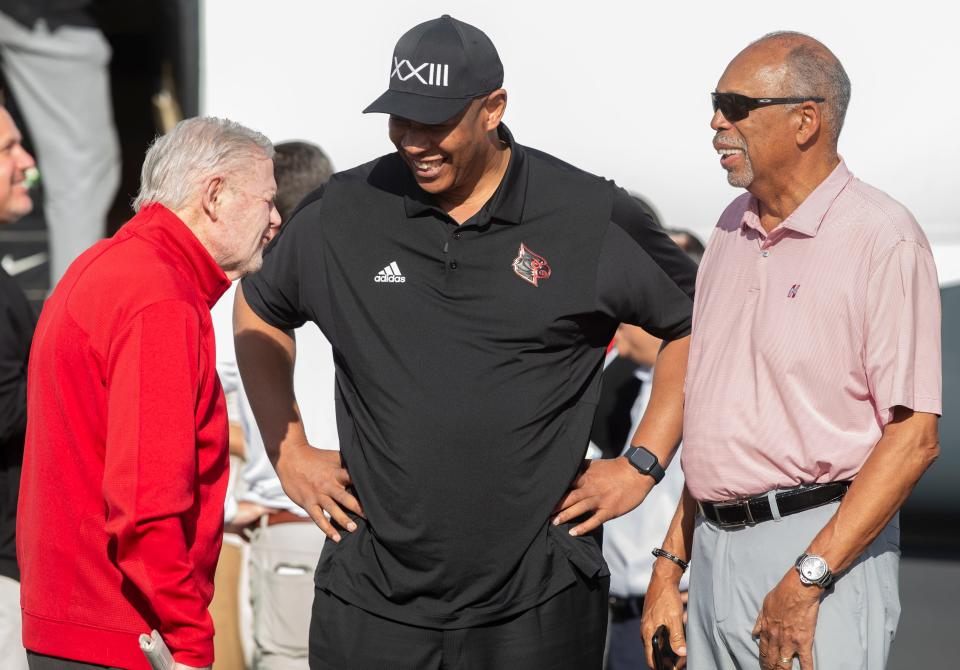Louisville basketball legends who broke barriers to share stories about time with Cardinals
They call themselves "Memory Lane."
Once a month, a group of University of Louisville graduates, many of whom suited up for the Cardinals on the basketball court or the football field during the 1960s and 70s, gather on a video call to reconnect and reminisce on their college days. There's no shortage of groundbreakers among them, including Wade Houston and Eddie Whitehead.
"We rib each other," said Whitehead, who along with Houston and the late Sam Smith broke the Louisville men's basketball color barrier in 1962. "We tell the same old locker room jokes we told when we were back at U of L."

"Memory Lane" will come to life Wednesday, Sept. 27, when Whitehead and Houston reunite in Louisville with another member of the group chat, U of L women's hoops pioneer Valerie Combs, for an event called "Basketball and Brotherhood" at the Muhammad Ali Center. Their conversation will focus on how their experiences at the university during desegregation shaped them and paved the way for others, including roundtable participant Judge Derwin Webb, a former captain of the men's basketball team who graduated in 1993 and became the commonwealth's first Black family court judge.
The event was originally scheduled for April 12, but organizers with the nonprofit Kentucky to the World opted to postpone in the wake of the April 10 mass shooting at Old National Bank.
'Cardinal till the day I die'
Combs, the first woman to sign with U of L on a basketball scholarship in 1976, was born in Louisville but didn't call the city home until moving back with her family in the ninth grade. A self-described "Air Force brat" who lived in communities around the world while he father served, Combs said she felt "right at home" at Butler High School. When the Bears won the first KHSAA Girls Sweet 16 championship in 1975, she and the other members of the team were celebrated around town.
A year later, Combs said she faced backlash from the head women's basketball coach at Kentucky State University when she chose to attend Louisville — following her Butler coach Peggy Fiehrer — instead of the historically Black college in Frankfort. After informing the Thorobreds' coach at the time of her plans, Combs said she was made to feel like a "sellout" who was "turning my back on my race."

Remembering a Louisville legend: How Felton Spencer impacted lives on his journey to basketball stardom
"That was the one time," Combs said, "where I felt like somebody insulted me."
The first woman to score 1,000 points in Louisville history, Combs now works as the university's director of development for diversity and engagement, spearheading philanthropic efforts for campus initiatives. She's almost always present when the women's team plays at KFC Yum! Center. During a game this season, she received the ACC's UNITE Award, which recognizes individuals who have made an impact in areas of racial and social justice.
"I just love being a part of the program," she said. "I'll be a Cardinal till the day I die."
'Someone sitting at the table who represents the players'
Whitehead grew up attending schools in Lincoln Heights, Ohio, after his parents, former sharecroppers, moved their nine children north from rural Mississippi. When he signed to play at U of L for head coach Bernard "Peck" Hickman and assistant John Dromo, he said he didn't realize he would be reentering the version of the world his mother and father chose to escape.
Whitehead said, in walking into the cafeteria for lunch one day, a white football player "decided my welcome would be his jumping up on a chair and making monkey sounds and gestures."
"I had to just deal with that without getting myself into trouble, and by doing so it kind of changed the tone of how people reacted," Whitehead said. "Things like that we had to put to bed as quickly as we could."

Whitehead became the first in his family to graduate college and also left U of L as a commissioned Air Force officer through the university's Reserve Officers' Training Corps. When his service ended, he entered the real estate business and built a five-station radio and television group from the ground up.
Whitehead's son, former U of L forward Luke Whitehead, is co-producing a documentary about the men who broke the basketball program's color barrier. Clips of the film will be interspersed throughout Wednesday's event at The Kentucky Center. There's still work to be done, however, after the story came full circle with the hiring of Kenny Payne — a 1989 U of L graduate — as the first Black head basketball coach in Louisville history last year.

"In any industry, I always look at who's running the show. Who are the decision-makers?" Whitehead said. "Up until now, you couldn't really say we were in a vital role in terms of leadership in the basketball program. Now, we can say that. Now, we have someone sitting at the table who represents the players who are on the roster."
Louisville basketball schedule 2023-24: See Kenny Payne and the Cards' upcoming slate of games
How to attend 'Basketball and Brotherhood: Breaking Barriers'
When: 6:30 p.m. Wednesday, Sept. 27 (reception starts at 5:30 p.m.)
Where: Muhammad Ali Center (144 N 6th St.)
Tickets: $30 per adult plus fees; students get in free with valid ID
Reach Louisville men's basketball reporter Brooks Holton at bholton@gannett.com and follow him on X at @brooksHolton.
This article originally appeared on Louisville Courier Journal: Muhammad Ali Center events 2023: Louisville basketball legends speak

